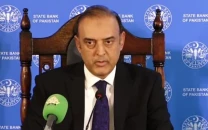Financial inclusion demands digital shift
Legacy infrastructure collapsing under weight of rapid entry of millions into formal financial system

Pakistan's banking landscape is undergoing a seismic transition as the country's traditionally branch-centric system struggles to cope with a massive influx of new customers entering the formal financial network.
With tens of millions of unbanked Pakistanis now seeking digital access to payments, remittances, and savings, industry experts say that the existing brick-and-mortar model is no longer equipped to handle the scale or speed of demand. As financial inclusion accelerates, banks are being pushed towards an entirely new digital-first business strategy to serve a rapidly expanding and increasingly tech-dependent population.
Mashreq on Monday formally launched Mashreq NEO, Pakistan's first Islamic-first digital banking platform, positioning the UAE-based bank at the centre of a fast-evolving financial ecosystem defined by soaring digital payments, rising remittance needs, and a growing base of underserved customers across rural and low-income segments.
Built on a cloud-native architecture aligned with the State Bank of Pakistan's digital banking framework, NEO aims to provide secure, paperless, and value-based banking to millions of Pakistanis, especially those still outside the formal economy.
With a roadmap to serve 10 million customers in the next five years, Mashreq NEO is targeting multiple underserved groups: salaried professionals frustrated by legacy banking delays, freelancers struggling with cross-border transfers, small-town and rural users with limited branch access, and women seeking transparent, low-cost financial services.
The bank is also pushing aggressively into the high-value remittance corridor, especially the UAE-Pakistan route, by enabling instant, zero-fee account opening and transfers for non-resident Pakistanis (NRPs) already banking with Mashreq in the Gulf.
Pakistanis send home $9.3 billion annually from Saudi Arabia and $7.8 billion from the UAE alone, a combined $17.1 billion from just two corridors.
Mashreq Bank Pakistan CEO Muhammad Hamayun Sajjad said the digital platform is designed to solve deep-rooted structural problems in Pakistan's banking industry, where digital usage is high but digital capacity remains limited.
"We have 9.1 billion digital transactions annually worth around Rs612 trillion. But the architecture behind the system is outdated, built around branches, paperwork, and core systems designed decades ago," he said. "We see this as an opportunity. A digital bank, if done right, can disrupt the market, reduce costs for customers, and expand inclusion at scale."
Pakistan's digital economy has expanded sharply, with mobile and internet penetration rising, but inclusion remains uneven. Despite 65% of Pakistanis holding a bank account, effective financial inclusion is only 28%, driven by millions of dormant or inactive accounts.
Rural areas remain largely cash-based, while freelancers and micro-entrepreneurs face steep banking fees and documentation barriers. NEO's onboarding - no references, no paperwork, account opening in minutes – is designed to break these bottlenecks.
Sajjad drew parallels to Nubank, the Brazilian digital bank that transformed financial inclusion and contributed nearly 1% of Brazil's GDP through reduced fees, simplified access, and mass onboarding. He said Pakistan is ready for a similar leap.
"One bank in Brazil helped 22 million people open their first-ever bank account. It reduced banking fees from 3.3% to 1.1%. Imagine the impact if Pakistan adopts a similar model," he said. "Digital architecture, if ethical and transparent, can contribute billions back to the economy."
"We are entering Pakistan humbly, ready to listen to needs and take care of local cultural values to present our solutions," said Fernando Morillo, Group Head of Retail Banking at Mashreq & Chairman, Mashreq Bank Pakistan.
Mohamed Abdel-Razek, Head of Technology at Mashreq Bank, said the bank has hired over 400 talented Pakistanis across multiple cities – over 30 – who are contributing tech solutions as per local needs.
Mashreq NEO positions itself as a challenger to both fintechs and traditional banks in the competitive remittance and payments market. Fintech operators like SadaPay, NayaPay, and international players such as Wise have grown rapidly by offering seamless transfers and low fees. Traditional banks, meanwhile, still rely heavily on branch-based models and higher charges for OTC transactions.






















COMMENTS
Comments are moderated and generally will be posted if they are on-topic and not abusive.
For more information, please see our Comments FAQ